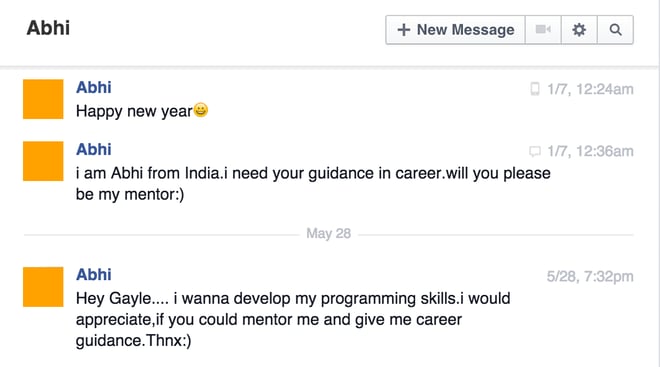The SaaS startup scene is big, complicated and competitive, and growing bigger, more complicated and more competitive each day. Great ideas and fantastic products abound, and increasingly, the fine line between success and failure seems to come down to who you know.
Many of the biggest names in tech benefited from the mentorship of seasoned entrepreneurs: Mark Zuckerburg had Steve Jobs, Bill Gates had Warren Buffet, and Sheryl Sandberg benefited from the guidance of her former college professor, Larry Summers.
In the hunt for any kind of competitive edge, this raises an important question: do you need a startup mentor?
What is a Startup Mentor?
In simple terms, a startup mentor is somebody that's been in your position, worked through it, and come out the other side; somebody with:
- Experience in your industry (ideally both success and failure).
- Expertise in a specific area of growth you're struggling with.
- Willingness to help you grow, both professional and personally.
Their advice is invaluable for helping you grow your business with fewer expensive mistakes and wrong-turns; instead of relying on trial-and-error, you can ask for their guidance, and say 'How did you solve this problem? How can I do the same?'
Strengths
- Unbiased advice. Mentors are there to help you grow, even if that means tough love and hard-hitting advice.
- Personal advice. Mentors often develop personal relationships with their mentorees, and help them work through the highs and lows of growing a startup.
- Connections. Great mentors tend to be well networked, and can often introduce you to potential employees, investors and other mentors.
- Recognition and social proof. Mentoring often comes with the implication of endorsement, and getting help from a big name can work wonders for your profile.
Weaknesses
- Mentors help at their discretion. The best mentors are often incredibly busy people, and they won't have a minimum commitment like advisors or consultants would.
- Great mentors are in short supply.
"The essential paradox is that the very people you would want as mentors are exactly the same people who simply don't have the time to serve in that role, because they're doing the things that make them good mentors in the first place."
Where Can You Find a Startup Mentor?
Networking
There's no silver bullet for finding a mentor: the more people you talk to, the more likely you are to find somebody willing (and able) to help you out.
That said, the one thing you can do to kill a potential relationship stone-dead is to straight-up ask for their mentorship.
In the same way you'd ask someone for drinks before asking them to marry you, it's important to develop a rapport with a potential mentor before ever broaching the issue.
If all goes well, you may not even have to ask the question:
“...you can’t get a (good) mentor by asking someone to be your mentor.... [the] best mentor relationships seem to develop organically.
The entrepreneur has a series of interactions with someone and after a while both sides realise they’re getting value from the conversations and – de facto – the person has become a mentor.”
Accelerator programs
Organisations like 500 Startups and YCombinator offer access to some of the world's brightest business minds.
If you're lucky enough to become of the select few accepted into their programs, you'll have a wealth of potential mentors at your disposal.
'Mass-Mentoring'
Few startups make it into accelerator programs, and most don't have access to the fabled networks of Silicon Valley, Boston and NYC.
Thankfully, many high-profile mentors (smart people that they are) have found ways to scale-up their help, producing all-manner of blog posts, guides, webinars, podcasts, workshops and email courses to share their knowledge and demystify the startup world.
"...instead of trying to "find a startup mentor", I would strongly suggest that you devote that same energy to soaking up all of the publicly available 'mass mentoring', and then do the best job you can at whatever project or startup you're undertaking.
Do that, and the odds are surprisingly good that in the course of your activities, without forcing the issue or explicitly asking for mentorship, you will find that, as the old Eastern saying put it, "when the student is ready, the guru appears". "
Should You Pay Your Mentor?
If you're lucky enough to find a mentor, there's the awkward issue of payment to consider. With their advice and guidance capable of making the difference between success and failure, should you be paying your mentors for their help?
Here's a quote I came across, and one that's pretty reflective of common opinion:
"Perhaps the most important distinction between a mentor and an advisor is that a mentor is not on your payroll.
There is not a financial benefit to being someone’s mentor. A mentor has usually been in your position before and can offer advice to lead you in the right direction."
The argument goes that you're a small Startup business, and the pittance of remuneration you're able to offer a mentor would be a drop in the ocean of their existing wealth. Instead of being motivated by financial reward, mentors help out for personal enjoyment, and philanthropy.
I'd agree with that sentiment, and in most cases, you aren't expected to pay your mentor.
But you still should.
Smart, successful, experienced entrepreneurs are few and far between; those willing to actually give up their time to help you, Joe/Jane Unknown, are even rarer.
There are relatively few great mentors around, and a ton of cut-throat Startups vying for their attention. If you're lucky enough to land a killer mentor, make sure they stick around, and add benefit above and beyond the warm fuzzy feeling they get from helping you.
Even if you don't offer a significant financial reward, you're still demonstrating that you value their advice.
The 2.5x Rule
So when does free advice become worth paying for?
Jason Lemkin (of Echosign and SaaStr fame) came up with the 2.5x rule.
Great mentors will stick around, and help you work through multiple issues. If your mentor is one of these good guys, and they're there to hold your hand through 2-3 big decisions, pitches or introductions, they're worth paying- either through token stock options or the opportunity to participate in your next round of funding.





